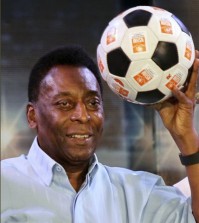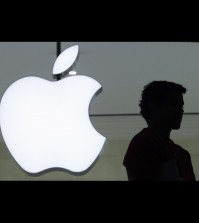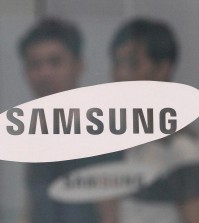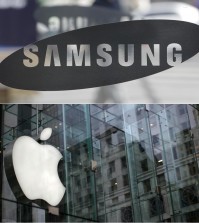- California Assembly OKs highest minimum wage in nation
- S. Korea unveils first graphic cigarette warnings
- US joins with South Korea, Japan in bid to deter North Korea
- LPGA golfer Chun In-gee finally back in action
- S. Korea won’t be top seed in final World Cup qualification round
- US men’s soccer misses 2nd straight Olympics
- US back on track in qualifying with 4-0 win over Guatemala
- High-intensity workout injuries spawn cottage industry
- CDC expands range of Zika mosquitoes into parts of Northeast
- Who knew? ‘The Walking Dead’ is helping families connect
Samsung, Apple make big compromise
By Kim Yoo-chul

A woman walks by advertisement posters of Samsung Electronics’ Galaxy S5, Apple’s iPhone 5s and iPad Air at a mobile phone shop in Seoul, Wednesday. (AP)
Samsung Electronics and Apple have agreed to drop all 30 outstanding lawsuits over patent infringements in eight countries, except for the United States.
The announcement comes a few days after Samsung heir and vice chairman Lee Jae-yong flew to the United States last week with the reported goal of reaching a negotiated settlement in its dispute with Apple.
The eight are Germany, the United Kingdom, Japan, Australia, the Netherlands, France, Italy and South Korea.
“Samsung and Apple agreed to drop all litigation outside the United States,” Samsung said in a statement Wednesday.
Samsung Electronics said the agreement doesn’t mean that they are planning to sign a comprehensive cross-licensing deal, allowing them to access each other’s patents by paying royalties.
“Samsung wants to make sure that existing court cases in the United States will be continued,” said the Samsung statement.
“It’s fair to say that Samsung wants to focus efforts on ongoing trials in two California courts, both of which are in the appeals stage. But Samsung and Apple attorneys are currently involved in working-level discussions to find common ground before signing a peace treaty even in the United States,” said one source who is directly involved with the Samsung-Apple case, by telephone.
Earlier, a Californian jury awarded Apple $120 million in an infringement suit against Samsung, much less than the $2 billion it sought.
Apple previously settled its patent dispute with Google’s Motorola Mobility in May in a deal that didn’t feature a cross-license and agreed to work with Google on “some areas of patent reform,” said a patents expert.
“The latest agreement between Samsung and Apple means the two companies have no questions that patent disputes are just a waste of time and money,” said Chung Yong-jae, a patent attorney based in Seoul.
Reports and Samsung insiders said that the main purpose of Lee’s trip to the United States was aimed at seeking a breakthrough in its stalled negotiations over legal cases in the United States.
Officials at Samsung Future Strategy Office declined to comment about details of Lee’s trip.
Over the past few years, however, Lee has been raising his international profile by meeting with influential industry executives at major events.
“You need to think that there have been no additional legal disputes over the previous two years since early 2012,” the patent attorney Chung added.
Market analysts say Samsung needs Apple, and vice-versa, amid the industry’s new trends for wearable devices, smart cars and connected home solutions as the smartphone industry is seeing signs of saturation.
Apple first sued Samsung in the U.S. for copying features of the iPhone in 2011.
















